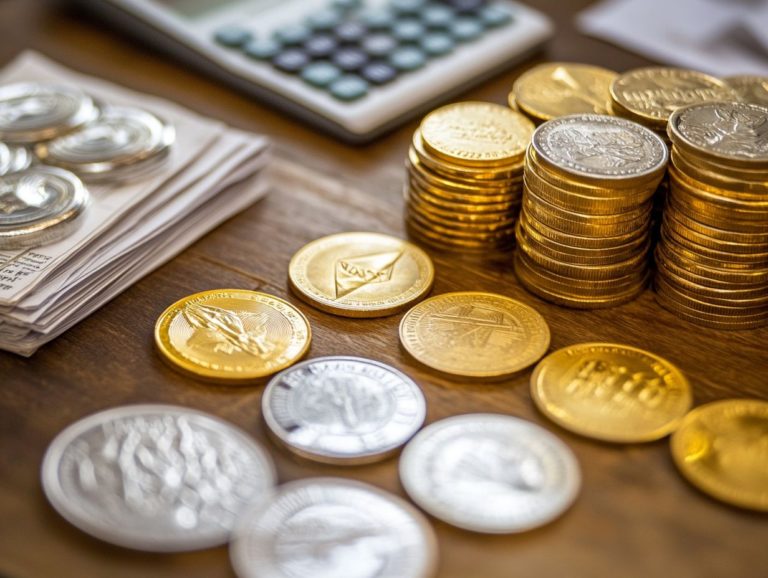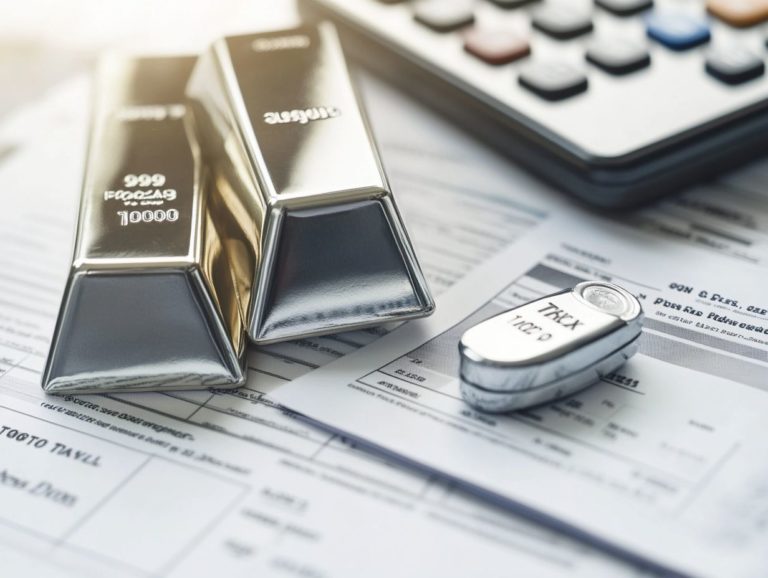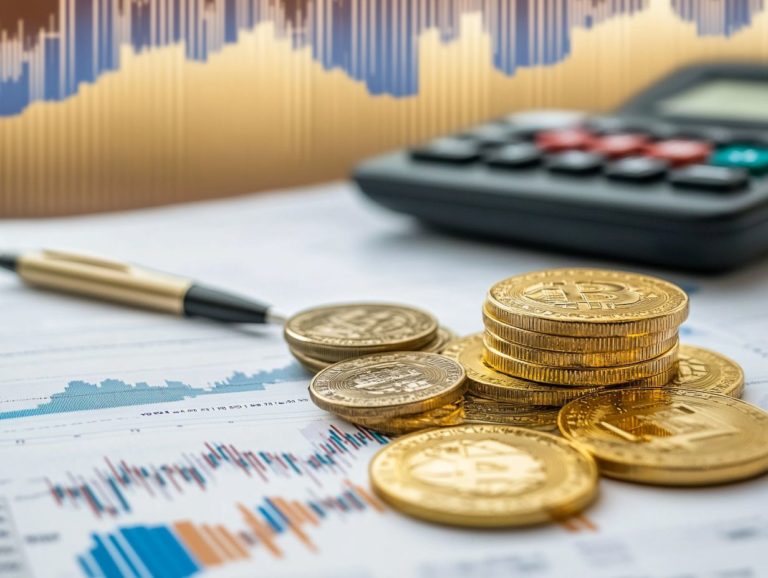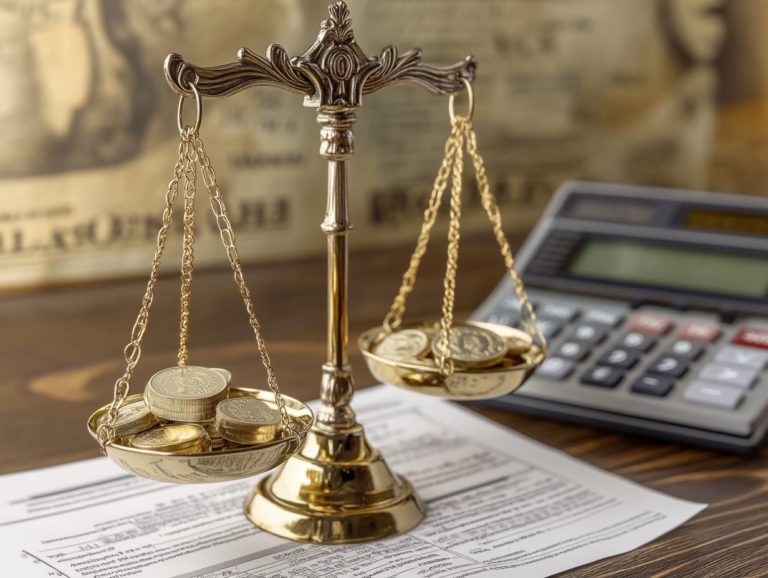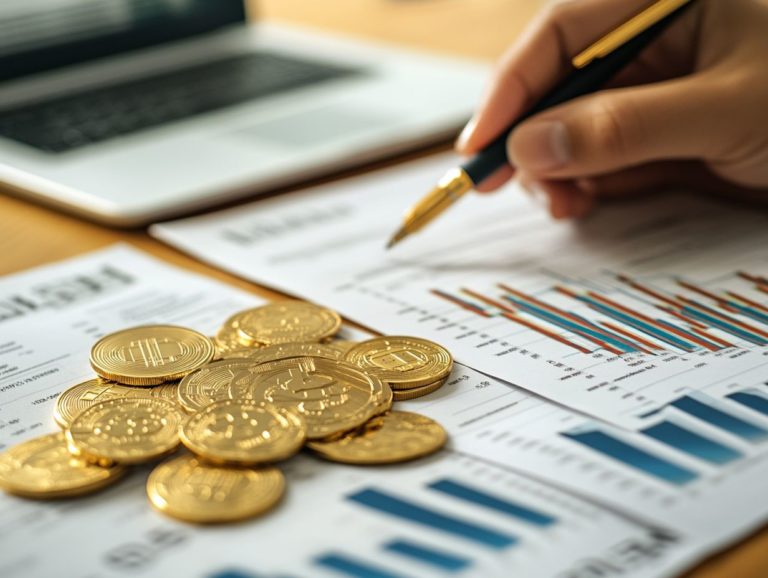The Tax Consequences of Trading Precious Metals
Trading in precious metals is exciting. It offers investment opportunities and poses financial challenges. As you explore various types of precious metals and trading strategies, it s crucial to grasp the tax implications involved.
Navigating capital gains tax and reporting requirements can feel overwhelming. However, understanding this financial landscape is essential. This article will illuminate tax strategies, highlight potential penalties for non-compliance, and emphasize the value of seeking professional advice to boost your trading returns.
Let s delve into the vital information that every precious metals trader should be aware of.
Contents
- Key Takeaways:
- Overview of Precious Metals Trading
- Tax Implications for Precious Metals Trading
- Tax Strategies for Precious Metals Traders
- Potential Penalties for Tax Non-Compliance
- Seeking Professional Tax Advice
- Frequently Asked Questions
- What are the tax consequences of trading precious metals?
- Do I have to pay taxes on every trade I make with precious metals?
- Are there any tax benefits to trading precious metals?
- What is the tax rate for short-term and long-term gains on precious metal trading?
- Can I deduct any losses from trading precious metals on my taxes?
- Do I have to pay taxes on inherited precious metals?
Key Takeaways:
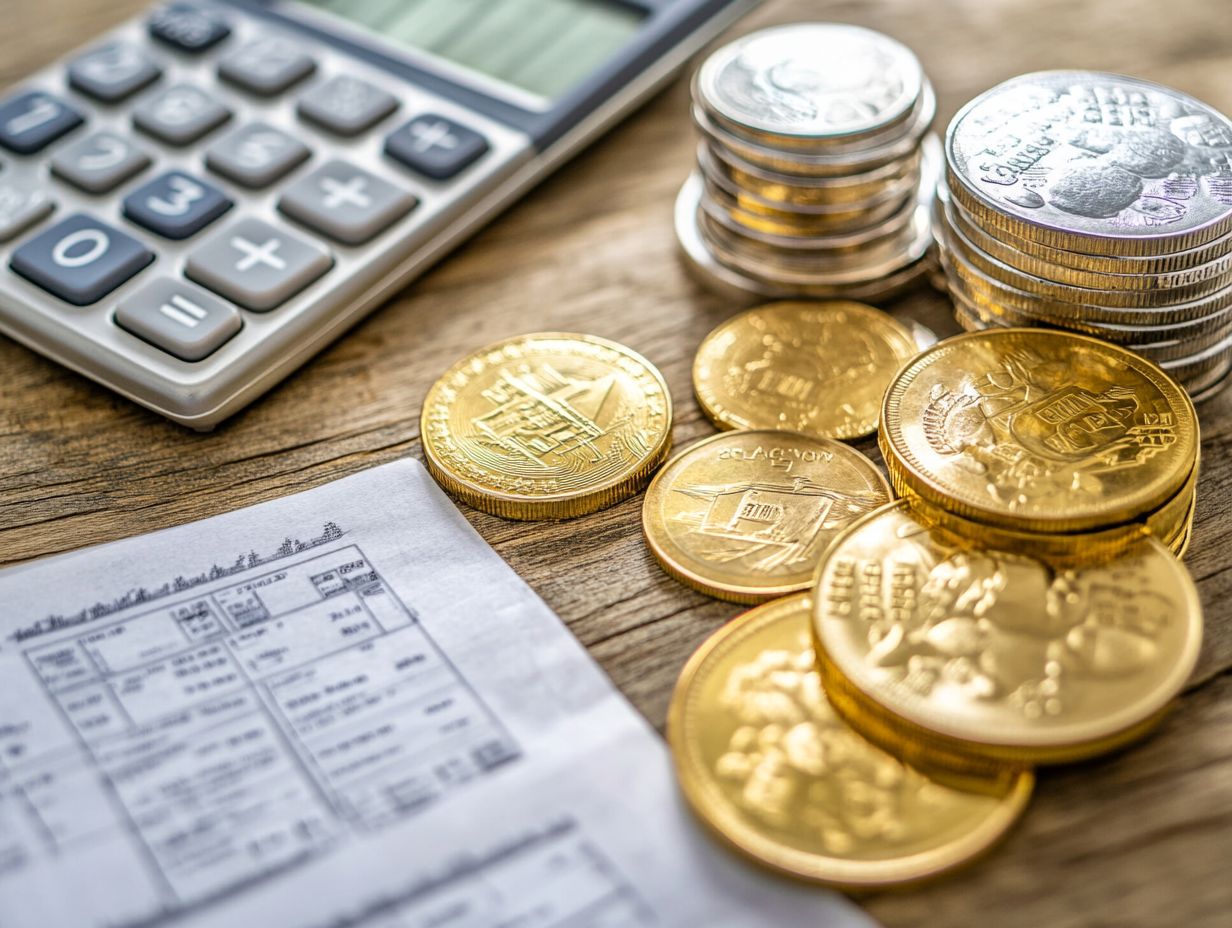
- Precious metals trading can have significant tax implications, including capital gains tax and reporting requirements.
- Traders can maximize tax efficiency by utilizing strategies such as tax-loss harvesting and holding precious metals in a retirement account.
- Failure to comply with tax laws can result in penalties. Seeking professional tax advice is vital for traders.
Overview of Precious Metals Trading
Precious metals trading offers a range of investment opportunities, including gold, silver, and platinum. These assets appeal especially during economic uncertainty. Precious metals can serve as a reliable hedge against inflation and currency devaluation, making them attractive for diversifying your portfolio.
Beyond traditional buying and selling, consider ETFs and mutual funds dedicated to these commodities. They provide both liquidity and exposure to the precious metals market. Additionally, it’s important to be aware of the tax consequences of buying precious metals abroad. Consulting a financial advisor can be invaluable in crafting strategies that align with your unique investment goals.
Types of Precious Metals and Trading Methods
The primary types of precious metals including gold, silver, and platinum each present unique trading methods and investment opportunities tailored to your preferences.
These metals possess distinct characteristics that attract various investors. Gold often stands out as a safe haven during economic uncertainty, offering a sense of security. In contrast, silver tends to be more volatile, influenced by both industrial demand and its role as a financial asset. Platinum, being rarer, has unique applications in the automotive industry, making it intriguing for informed investors.
Market demand for these metals fluctuates based on economic conditions, geopolitical tensions, and currency values. These factors can significantly impact your trading strategies. Additionally, it’s important to understand the tax implications of precious metals trading. Consider avenues such as ETFs and mutual funds for diversified exposure to these precious assets.
When weighing your options, evaluate your investment objectives, risk tolerance, and timeline for reaching your financial goals. Ensure your choices harmonize with your overall portfolio strategy.
Tax Implications for Precious Metals Trading
Understanding the tax implications of precious metals trading is essential for you as an investor. The Internal Revenue Service (IRS) categorizes precious metals like gold and silver as collectibles. This classification can significantly affect how your capital gains are taxed.
Recognizing this distinction is key to navigating your investment strategy effectively.
Don’t miss out on these key tax strategies!
Capital Gains Tax
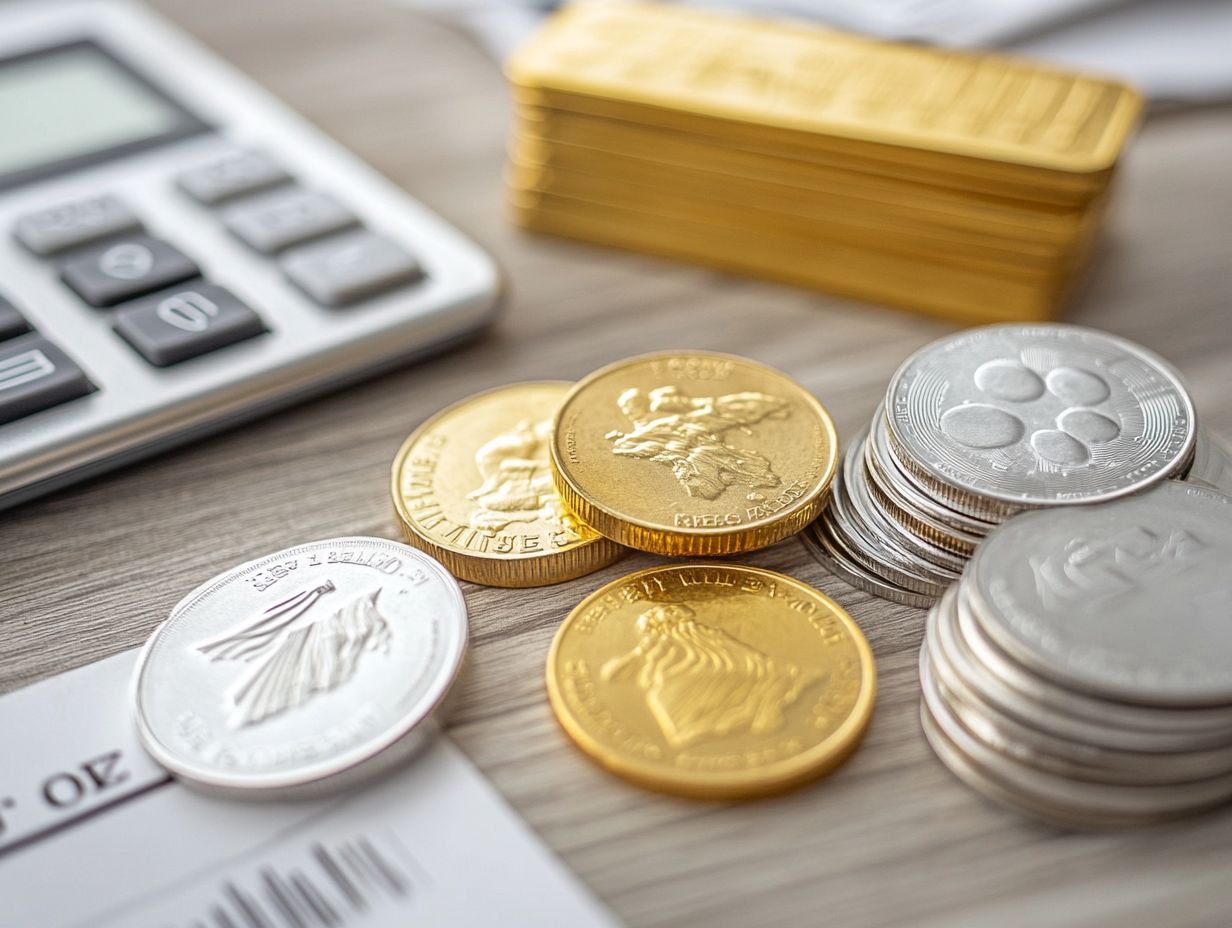
Capital gains tax applies to the profits you make from selling precious metals. The IRS imposes varying rates based on whether those gains are long-term or short-term.
Understanding these distinctions is essential for anyone looking to get the most out of their investments in things like gold or silver coins.
Typically, short-term gains those realized from assets held for one year or less are taxed at your standard income tax rates. These rates can be considerably higher than long-term rates.
For example, if you sell a gold bar after 11 months, you could face an income tax rate as high as 37%.
However, if you hold it for a full year and a day, that rate might drop to a maximum of 20%.
To lessen your tax liabilities, consider strategies like extending your holding period for metals or using tax-advantaged accounts.
You can also offset gains with losses in other parts of your investment portfolio.
Reporting Requirements
If you’re trading precious metals, you must understand the specific reporting requirements set by the IRS. This is especially important regarding the income tax implications of your transactions.
Knowing when to file Form 1099-B is crucial. This form is necessary for reporting capital gains related to these sales.
Typically, your brokers must submit this form by February 15 of the year after the trade.
Accurate reporting ensures compliance with IRS regulations and helps you avoid penalties and interest charges due to discrepancies in reported income.
Timely filing helps you manage your tax obligations and assess your financial standing over time.
Tax Strategies for Precious Metals Traders
Unlock the full potential of your investments by using smart tax strategies! You can minimize your tax burden and boost your profits!
Maximizing Tax Efficiency
Maximizing your tax efficiency means employing strategies that reduce your income tax obligations.
These strategies also optimize your returns from trading precious metals.
One effective approach is tax-loss harvesting. This means selling investments that are losing money to reduce your taxes on gains.
Implementing strategic asset allocation is essential. This strategy ensures your investments are diversified to reduce risks and increase growth.
By carefully balancing your portfolio, you can tailor your approach to align with current market conditions and your financial goals.
A knowledgeable financial advisor can be invaluable in this journey. They can help you navigate the complexities of tax strategy.
Together, you can craft a personalized plan that resonates with your unique circumstances, leading to better financial outcomes.
Potential Penalties for Tax Non-Compliance
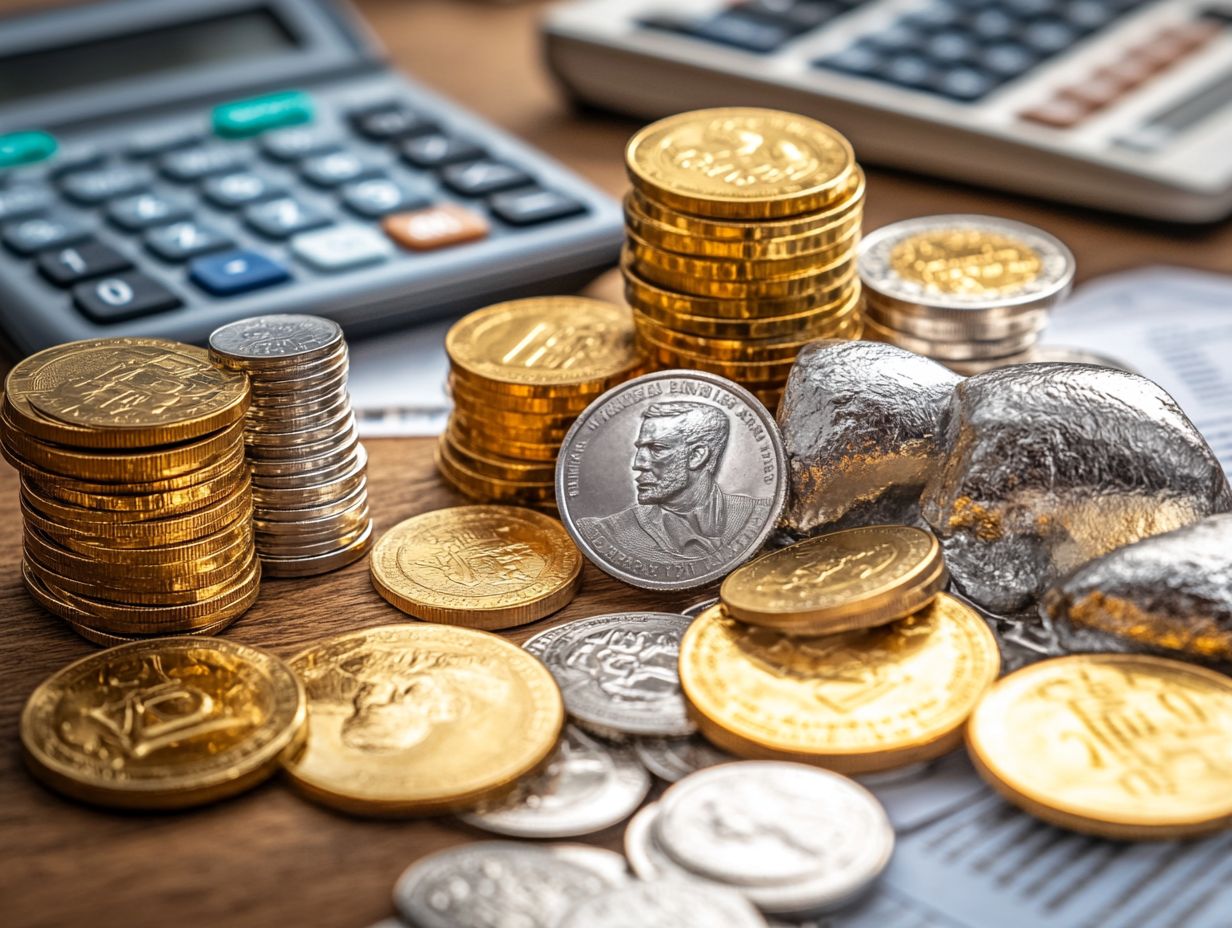
Failing to comply with tax regulations related to precious metals trading can result in significant penalties from the IRS.
This reality emphasizes the critical importance of accurate reporting and strict adherence to legal obligations in your trading activities.
Consequences of Not Reporting Precious Metals Trading
Not reporting your precious metals trading can lead to serious tax problems, including hefty penalties from the IRS for non-compliance.
If you fail to disclose these transactions, you might face fines that can escalate dramatically, often reaching thousands of dollars. To better understand your obligations, it’s crucial to be aware of tax regulations for precious metals investors. Late reporting can incur interest charges that accumulate over time, compounding your financial burden.
These oversights can damage your financial reputation and lead to heightened scrutiny from tax authorities. In the long run, a tarnished reputation and financial penalties can hinder your future investment opportunities and complicate your dealings with brokers and financial institutions. This creates a vicious cycle that negatively impacts your overall financial health.
Seeking Professional Tax Advice
Seeking professional tax advice is a smart move for anyone involved in precious metals trading. A qualified financial advisor can provide personalized guidance on tax planning and strategies to minimize your tax liabilities effectively.
Why You Need a Tax Expert on Your Side
Consulting a tax professional offers numerous advantages, including expert insights into tax laws and tailored strategies for effective tax planning.
Their profound understanding of taxation intricacies leads to optimized tax strategies and ensures compliance with ever-changing regulations. By navigating deductions and credits that you might otherwise overlook, a tax expert can help you unlock potential cost savings that significantly improve your financial outcomes.
Through a collaborative approach, they can help you whether as an individual or a business create a comprehensive financial plan. This plan includes effective budgeting, retirement strategies, and investment methods, all aimed at maximizing your long-term wealth while minimizing tax liabilities.
Frequently Asked Questions
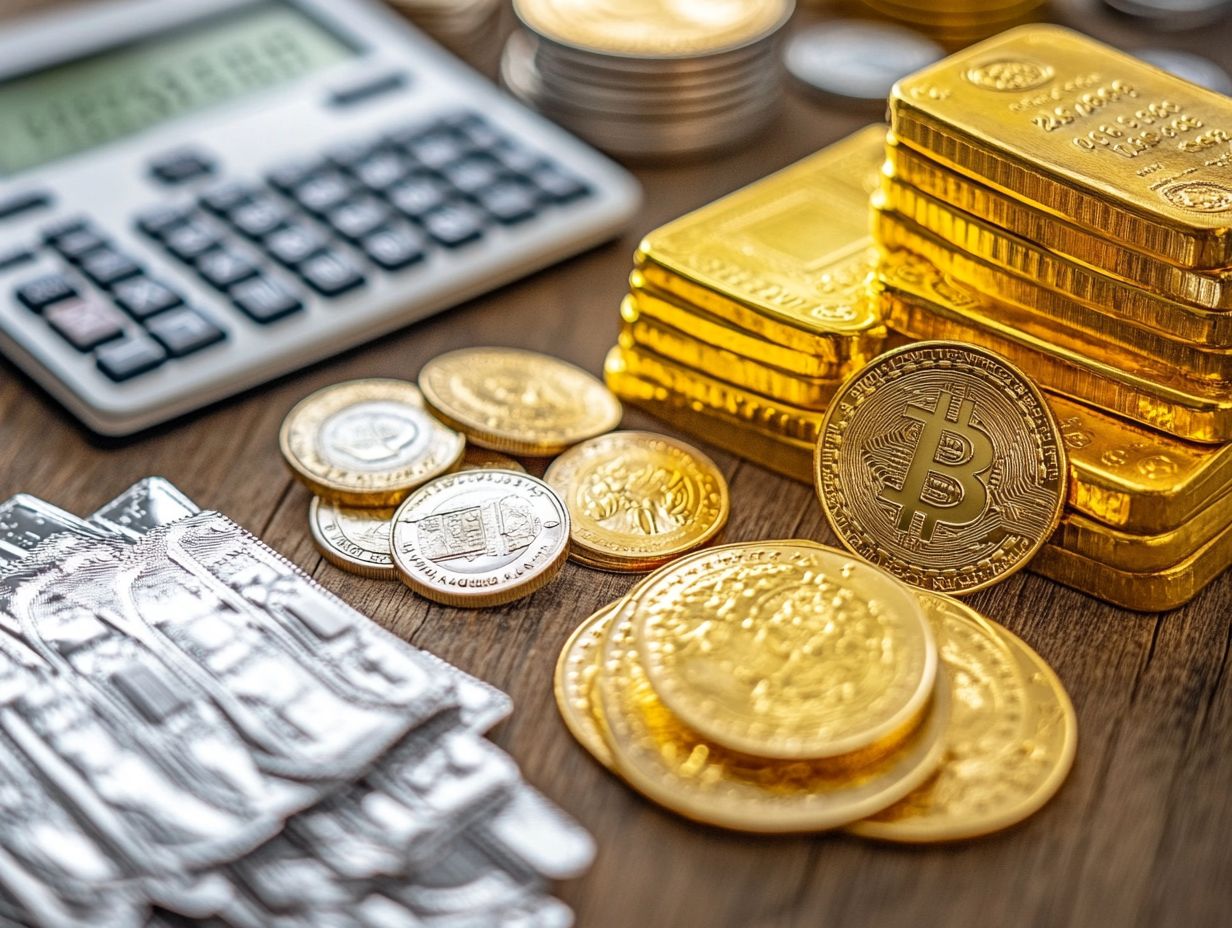
What are the tax consequences of trading precious metals?
The tax consequences depend on the type of metal and the holding period. Gold and silver are considered collectibles by the IRS. They are subject to a higher capital gains tax rate of 28% for short-term holdings (less than a year) and 15% for long-term holdings (more than a year).
Do I have to pay taxes on every trade I make with precious metals?
No. Taxes are only incurred when you sell or exchange your precious metals. If you hold onto your metals without selling them, you don t owe any taxes.
Are there any tax benefits to trading precious metals?
Yes. Precious metals held in an Individual Retirement Account (IRA) are not taxed until they are withdrawn, allowing for potential tax-deferred growth.
What is the tax rate for short-term and long-term gains on precious metal trading?
If you hold onto your precious metals for less than a year before selling, you will pay the short-term capital gains tax rate, which is your regular income tax rate. Long-term gains, for metals held for more than a year, are subject to a lower capital gains tax rate.
Can I deduct any losses from trading precious metals on my taxes?
Yes. If you sell your precious metals at a loss, you can deduct that loss from your taxable income, up to $3,000 per year. Any remaining losses can be carried over to future tax years.
Do I have to pay taxes on inherited precious metals?
If you inherit precious metals, the cost basis will be the market value at the time of the original owner’s death. Any gains or losses made after that will be subject to capital gains tax when you sell the metals.
Don’t risk your financial future consult a tax professional today!










